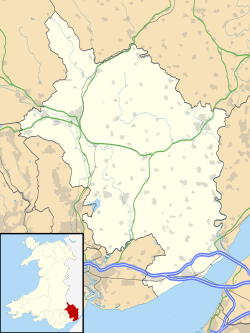| St Peter's Church, Llanwenarth, Monmouthshire | |
|---|---|
| Church of St Peter | |
 The nave and tower | |
| 51°49′38″N3°03′09″W / 51.8272°N 3.0525°W | |
| Location | Llanwenarth, Monmouthshire |
| Country | Wales |
| Denomination | Church in Wales |
| History | |
| Status | Parish church |
| Founded | C14th century |
| Architecture | |
| Functional status | Active |
| Heritage designation | Grade II* |
| Designated | 9 January 1956 |
| Architectural type | Church |
| Administration | |
| Diocese | Monmouth |
| Archdeaconry | Monmouth |
| Deanery | Abergavenny |
| Parish | Llanwenarth Citra |
| Clergy | |
| Vicar | The Reverend Canon M Soady |
The Church of St Peter, Llanwenarth, Monmouthshire is a parish church with reported origins in the 6/7th centuries. The current building dates from the early 14th century. Rebuilt in the 19th century, it was listed Grade II* in 1956. It remains an active Church in Wales church in the parish of Llanwenarth Citra.
